News
Prices tick higher after yet another power bill revision
View(s):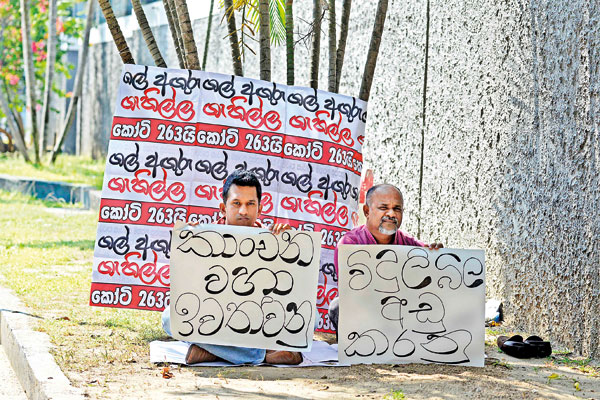
Electricity consumers have started to express their anger at shocking tariff hikes. Pic by Indika Handuwala
By Kasun Warakapitiya
Within hours of the revision, eateries raised the price of a packet of rice and curry by Rs 50, and kottu by Rs 30. Snacks and iced drinks now cost more.
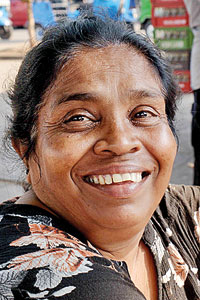
Mala Gunawathie: Not in a position to pay a big bill
Operators of laundries, motor mechanics, textile company owners as well as hoteliers are all concerned.
The Ceylon Electricity Board announced that the Public Utilities Commission (PUCSL) approved an increase in electricity tariffs by an average of 66% effective from Wednesday. The charge for the first 30 units under the domestic category which was Rs 8 will rise to Rs 30.
Most business operators say they will increase charges.
Laundry manager, Daniel Bandara who had been in business for six years at Thimbirigasyaya, said charges were raised by 20% this week. “We anticipated our electricity costs would increase. With the previous increase six months back, my electricity bill reached Rs 150,000.’’
Owners of eateries said their costs will rise, again.
Canteen Owners Association president, Asela Sampath said the price of meals such as kottu, fried rice, and rice packets, will rise by 10%. “An Rs 300 kottu will be sold for Rs 330.’’
Canteens use electrical appliances such as rice cookers and ovens, he said.
Meanwhile, M Nazir, a meat shop owner who has freezers, said that now he pays Rs 16,000 for electricity compared with the Rs 9,000 domestic user bill earlier.
He said his income from the business is not enough to pay higher tariffs.
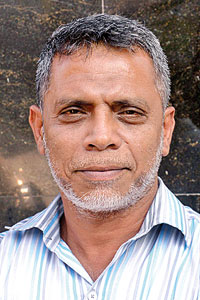
M. Nazir: Meat business hit by tariff hike
Peliyagoda resident Mala Gunawathie, who sells lottery tickets, told the Sunday Times that prices of everything have risen. “I cannot afford higher electricity expenses from the daily wage of Rs 1,000 I earn. I have to feed my children.’’
Already, her electricity bill is Rs 4,000 and she said she will not be able to pay more.
The Bakery Owners Association’s president N.K Jayawardena said: “Already 2,000 bakeries out of 7,000 have closed down. We are unable to bear more costs.’’
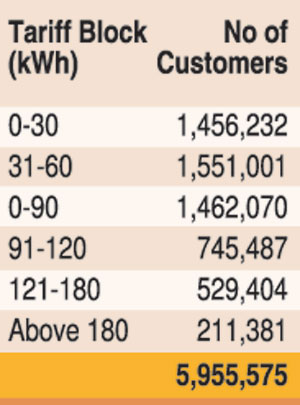 Bakeries use fridges, electric ovens, and flour mixers, and will have to bear a greater burden, he said.
Bakeries use fridges, electric ovens, and flour mixers, and will have to bear a greater burden, he said.
Hotels of the Hoteliers Association fit into a tariffs category that is at a higher tariff level compared with other industries.
Association president, Shanthi Kumar said the industry should not be subjected to the 67% tariff increase.
“We presented our proposals to the minister of power and energy, Energy authorities as well as PUCSL, but it fell on deaf ears.’’ He said hotel operators cannot restrict guests from using lights and air conditioning.
| Many ways to slash your electricity bill Do you know that Light-Emitting Diode (LED) bulbs consume significantly less energy compared to incandescent ones? A 9W compact fluorescent lamp gives as much light as a 75W incandescent lamp. Yet, the two bulbs will affect your electricity bill differently. Lighting accounts for fifteen percent of electricity usage in a normal household. Therefore, investing in efficient lighting saves a great deal. With the electric tariff being increased to the shocking level of 66 percent this week, it is imperative that power consumers remain mindful of their energy consumption. Here are some tips on how you can save energy at home throughout your daily tasks and avoid hefty bills at the end of the month. Most refrigerators, especially freezers are energy guzzlers. You may not realise it, but they consume 30 – 50% units of a normal household. But most refrigerators are underutilised. They don’t contain more than a few bottles of water, dry fish and leftovers of cooked food. Choosing the right size is critically important as the bigger the refrigerator’s capacity, the more energy it consumes. A 190-litre refrigerator would be sufficient for a family of five. Mind the door always since open doors result in a drop of 10-20C. Don’t stand with the door open while you drink water. If items that require deep freezing (ex: ice cream, meat, fish…etc.) are absent from the refrigerator, lower the settings to a bare minimum. Maintain settings at a 40% level (between 2 and 3 on a scale from 1 to 5), when deep frozen items are stored. When it comes to cooking, it’s high time we challenge our conventional chefs! Do you know the 20-40 minute cooking art? It’s tried and tested. Cut the vegetables, meat, and fish and leave them to season, add curry powder and other ingredients. Then turn the stove on and start cooking meat and vegetables, wash the rice in the meantime, start cooking those that require more fire, and proceed to those that require less fire. For more tips and resources on smart energy consumption, check out the guidelines prepared by Sri Lanka Sustainable Energy Authority — available on its website. https://www.energy.gov.lk/index.php/en/knowledge/resources/your-home | |
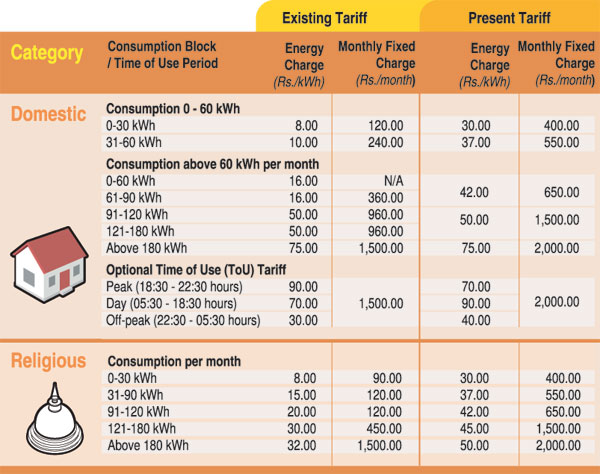 |
The best way to say that you found the home of your dreams is by finding it on Hitad.lk. We have listings for apartments for sale or rent in Sri Lanka, no matter what locale you're looking for! Whether you live in Colombo, Galle, Kandy, Matara, Jaffna and more - we've got them all!

